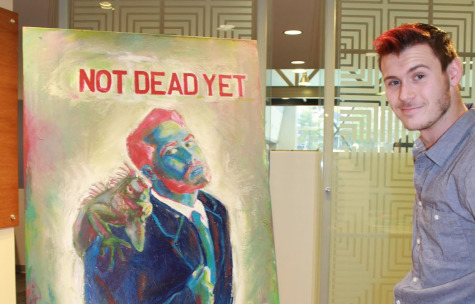Around the World: Former Students discuss experiences after moving to new countries
“I would say the main difference for me is the freedom.”
Judy Luo, sophomore at Shanghai American School, seems to jive with Lotta Hueneke and Noah Ham’s sentiments that the biggest difference between where they live now and where they lived last year, -St. Louis – is the freedom of travel.
“I can walk, take a taxi or ride the subway wherever I desire,” Luo said. “But I guess that comes with any urban city.”
Luo moved to Shanghai, China last summer so her family could be reunited after her father moved to China for a job when she was in sixth grade.
“It’s interesting to see how many people like my parents first emigrated to the U.S. for economic opportunity and now are immigrating back to China for the same reason,” Luo said. “I guess you go wherever the money is.”
Luo said she’s done well adjusting to life in China because of her Chinese heritage.
“There’s no language barrier since I can speak Mandarin,” Luo said. “Because I’d already experienced many aspects of China because my parents took us [Judy and her older sister, Nina] back almost every year before I moved, the culture shock was almost completely eliminated.”
Luo attends an international school opened by the American Consulate in 1912, where everything is taught in English and according to American curriculum standards.
“School life here is extremely similar to MHS,” Luo said. “The main difference is probably that we have the International Baccalaureate (IB) program [in addition to an Advanced Placement one]. I’ve learned that just because you move to a different country doesn’t mean you’ve actually moved.”
Noah Ham, a year 12, realized the world is huge when he moved to Surrey, in the South East of England, UK.
“Life here is shockingly different even though it’s an English-speaking country,” Ham said. “Most notably, everyone here walks.”
Ham said he recently realized he’s walked more in the last nine months than he has his entire life.
“My sister, Emma, and I both walk to and from school every day,” Ham said. “It’s about three miles from our house. In the U.S., I just would’ve driven us to school.”
Another major cultural difference Ham has noticed is in style.
“The style of clothing for guys is more dress casual here,” Ham said. “At MHS I usually wore sports shorts and hoodies, but now I wear button-down shirts with khakis or nice jeans. And some guys take it further by spending hours making their hair look perfect every morning.”
In terms of academics, Ham said school is more like university.
“I’m in what they call sixth form college, which is just juniors and seniors,” Ham said. “I’m only taking classes that will help me with my future career, and I only have four class periods every day, or less, and free periods where I’m able to do whatever I choose, whether it’s leaving campus and going into town for lunch or heading to the park with my mates to play some football or studying in the common room.”
Ham said testing is also strange because all the teachers do is teach material and move on.
“At the end of the year, we have A levels, which are a test over everything we learned during the year.”
Socially, Ham said he’s adjusted very well.
“Everyone here thought my accent was fascinating and it acted as a perfect ice breaker,” Ham said. “I’m less involved here than I was at MHS, though. I used to play a bunch of sports and never had a break, but here they don’t have sports attached the the school so you have to go and find clubs – every kid here wants to play either football or rugby, so all other sports have barely any funding.”
Lotta Hueneke’s, sophomore, enjoyed her experiences in Germany, where she moved last year with her mother after her parents divorced.
“The culture here is way more laid back,” Hueneke said. “You have the freedom to walk everywhere or take the train. I have a lot more freedom without depending on a car. I’m always hanging out with friends at a cute little cafe.”
School is conducive to this social atmosphere.
“We have a lot more classes during the day for shorter periods of time,” Hueneke said. “We have two 30 minute breaks where we eat and get to leave campus.”
Hueneke said she is planning on going to college in Germany, but it’s nice to have option to return to the U.S.
Ham’s still deciding where he’ll attend university.
“I love it here because it really is an international hub, and it’s a lot cheaper,” Ham said. “I do miss being with my friends and having decent food, though, so I have a lot of planning to do in the next year.”
And while Luo’s managed to get involved in some unusual extracurriculars in China including a micro-finance charity that supplies chickens to impoverished farmers in rural Jiangxi, she’s ready for another change.
“I am almost 100 percent sure I will go to college in the U.S.”
Your donation will support the student journalists of Marquette High School. Your contribution will allow us to purchase equipment and cover our annual website hosting costs. You may become a PATRON by making a donation at one of these levels: White/$30, Green/$50, Blue/$100. Patron names will be published in the print newsmagazine, on the website and once per quarter on our social media accounts.

Rennie Svirnovskiy is a senior with too many opinions. She fancies herself a professional scribbler; watches an exorbitant amount of British television;...




